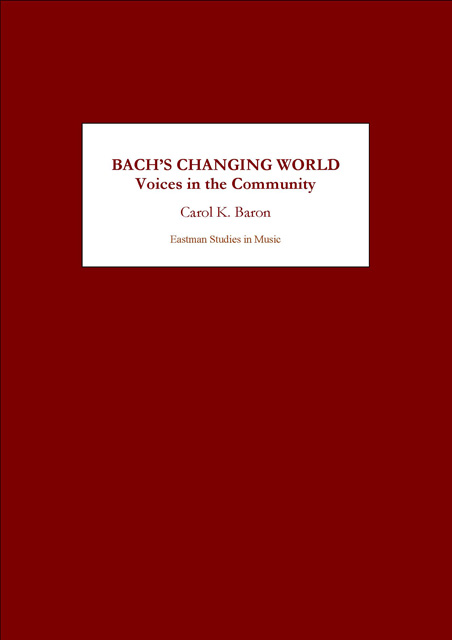Book contents
- Frontmatter
- Dedication
- Map
- Contents
- List of Illustrations
- Editor's Acknowledgments
- 1 Transitions, Transformations, Reversals: Rethinking Bach's World
- 2 Tumultuous Philosophers, Pious Rebels, Revolutionary Teachers, Pedantic Clerics, Vengeful Bureaucrats, Threatened Tyrants, Worldly Mystics: The Religious World Bach Inherited
- 3 Family Values and Dysfunctional Families: Home Life in the Moral Weeklies and Comedies of Bach's Leipzig
- 4 Bach in the Midst of Religious Transition
- 5 Bach's Situation in the Cultural Politics of Contemporary Leipzig
- 6 The Reception of the Cantata during Leipzig Church Services, 1700–1750
- 7 From Salon to Kaffeekranz: Gender Wars and the Coffee Cantata in Bach's Leipzig
- 8 A Treatise on Liturgical Text Settings (1710)
- 9 Random Thoughts About Church Music in Our Day (1721)
- Notes on the Contributors
- Index
- Eastman Studies in Music
3 - Family Values and Dysfunctional Families: Home Life in the Moral Weeklies and Comedies of Bach's Leipzig
Published online by Cambridge University Press: 17 March 2023
- Frontmatter
- Dedication
- Map
- Contents
- List of Illustrations
- Editor's Acknowledgments
- 1 Transitions, Transformations, Reversals: Rethinking Bach's World
- 2 Tumultuous Philosophers, Pious Rebels, Revolutionary Teachers, Pedantic Clerics, Vengeful Bureaucrats, Threatened Tyrants, Worldly Mystics: The Religious World Bach Inherited
- 3 Family Values and Dysfunctional Families: Home Life in the Moral Weeklies and Comedies of Bach's Leipzig
- 4 Bach in the Midst of Religious Transition
- 5 Bach's Situation in the Cultural Politics of Contemporary Leipzig
- 6 The Reception of the Cantata during Leipzig Church Services, 1700–1750
- 7 From Salon to Kaffeekranz: Gender Wars and the Coffee Cantata in Bach's Leipzig
- 8 A Treatise on Liturgical Text Settings (1710)
- 9 Random Thoughts About Church Music in Our Day (1721)
- Notes on the Contributors
- Index
- Eastman Studies in Music
Summary
The Leipzig that Johann Sebastian Bach came to know during the second quarter of the eighteenth century fostered the cultural development and economic growth that dominated the German-speaking contribution to European civilization of the day. An adequate understanding of the literature most closely associated with the city and the era, especially the moral weekly and the Leipzig comedy, can only emerge from familiarity with everyday life as well as literary life. Since the late 1960s, German Studies has paid increased attention to the socio-economic determinants that have prevailed during the highly diverse periods of a long literary tradition. This essay participates in that development by considering not only the world of letters, as closely defined, but also those elements of the everyday world that found reflection in literature.
Leipzig: The Trade Center
Since the Middle Ages, the everyday world of Leipzig had revolved around commerce. At Easter and Michaelmas, goods moving between German lands and, to the East, Poland and Russia, to the South, Italy, and, to the North, England and Scandinavia were put on exhibition at trade fairs rivaled in size and importance only by those held in Frankfurt. Wool and silken textiles were heavily represented; spices and wine were frequently offered by French and Italian exhibitors; leather and furs came from the East; and there was an active trade in gold, silver, and precious jewels.
As a natural crossroads for overland trade routes, Leipzig had actually managed to enhance its commercial position during the severe disruptions of the Thirty Years War (1618–48). The domestic Saxon woolen industry made the city a hub for trade in cloth of all kind, including the Silesian linen that was the German states’ single most important export commodity. The wholesale market in Swabian fustian, a blend of cotton and linen, was located in Leipzig, which also served as the north European center for the trade in Italian silk fabric. City merchants organized the markets for tin, copper, brass, and iron produced by mines in Saxony and Silesia. The export trade in metals grew as England and France began to industrialize in earnest.
Two small immigrant communities significantly advanced Leipzig's standing as a commercial center. French Huguenots displaced by Louis XIV's obtuse evictions transferred many of their contacts in the wine, oil, and luxury industries.
- Type
- Chapter
- Information
- Bach's Changing WorldVoices in the Community, pp. 86 - 107Publisher: Boydell & BrewerPrint publication year: 2006



